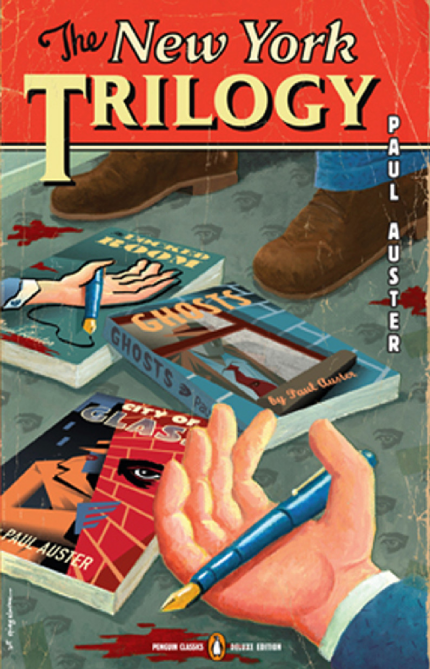The New York Trilogy: City of Glass, Ghosts, The Locked Room (New York Trilogy #1-3), by Paul Auster

The New York Trilogy: City of Glass, Ghosts, the Locked Room by Paul Auster
My rating: 5 of 5 stars
I think I must have been about 18 when my older brother gave me Paul Auster’s “The New York Trilogy” as a gift for my birthday. I started reading it – and hated it! I couldn’t get into it, couldn’t get a grip on it. I put it back into my bookshelf and forgot about it for a few years.
It fell again into my hands (quite literally!) when I reorganised my shelves and I decided to give it another chance. This time around, though, I just read and suspended judgement. I won’t lie to you: I had similar difficulties as before but this time I kept reading. And, somehow, things started falling into place…
With accepting that Auster employs a unique kind of storytelling came understanding and respect for his masterful writing. Ultimately, I became completely engrossed in the three interconnected novels that make up this trilogy.
The first novel, “City of Glass”, sets the tone for the rest of the trilogy with its atmospheric and almost dreamlike descriptions of New York City. Auster’s ability to capture the essence of the city, with all its chaos and intrigue, is truly remarkable. The protagonist, Daniel Quinn, is a complex and fascinating character who becomes embroiled in a mysterious case that takes him on a journey through the city and ultimately leads him to question his own sanity. The way Auster weaves together the themes of identity, language, and the power of perception in this novel is simply brilliant.
The second novel, “Ghosts”, picks up where “City of Glass” left off and follows a new protagonist, Blue, as he investigates a strange case involving a man named Black who may or may not be dead. As the story unfolds, the lines between reality and fiction become increasingly blurred, and Auster expertly explores the themes of memory, history, and the idea of the self.
So far, though, those novels didn’t seem like parts of a trilogy. Yes, there were interconnections, both obvious ones as well as more obscure ones but I was still a little sceptical…
And then came the final novel, “The Locked Room”, which brings the trilogy to a more-than-satisfying conclusion by tying together the threads that run throughout the three books. Sometimes these threads are so thin, they might be mistaken for an undercurrent or background noise and yet they’re there…
In this final part Auster took all those threads and wove them into a beautiful complex literary “tapestry” that even now, decades later, shines bright in my memory.
Its protagonist, Fanshawe, is a writer who mysteriously disappears, leaving behind a cache of unpublished manuscripts. As his childhood friend attempts to unravel the mystery of Fanshawe’s disappearance, the reader is taken on a journey through the worlds of literature, art, and the human psyche.
What I appreciated most about the “New York Trilogy” was Auster’s willingness to take risks with his writing. His art – and there can be no doubt this is on par with any other great piece of art – was obviously more important than mainstream success. I remain convinced that Auster lost many potential readers like he initially lost me.
And yet he took the risk and explored complex ideas and themes in a way that is both engaging and thought-provoking. The trilogy is filled with twists and turns that keep the reader on their toes, and the characters are so well-drawn that it’s impossible not to become invested in their stories.
In conclusion, I would highly recommend Paul Auster’s “New York Trilogy” to anyone who is looking for a thought-provoking and engaging read. Auster’s writing is truly masterful, and the trilogy as a whole is a testament to his brilliance and genius as an author.
After reading the “New York Trilogy” I’ve “blindly” bought each and every book Auster has written and with one exception (“4 3 2 1”) I’ve enjoyed them all. For me, Paul Auster has become an icon of literature and his “New York Trilogy” is the reason I hesitate to leave a book unfinished – what if it’s another unique masterpiece?!
Five stars out of five.
Ceterum censeo Putin esse delendam
View all my reviews